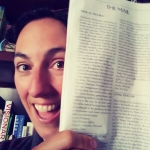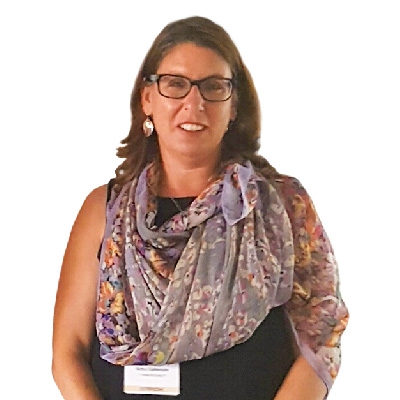Amy Liebman, Motivated Champion of Environmental and Worker Health Justice
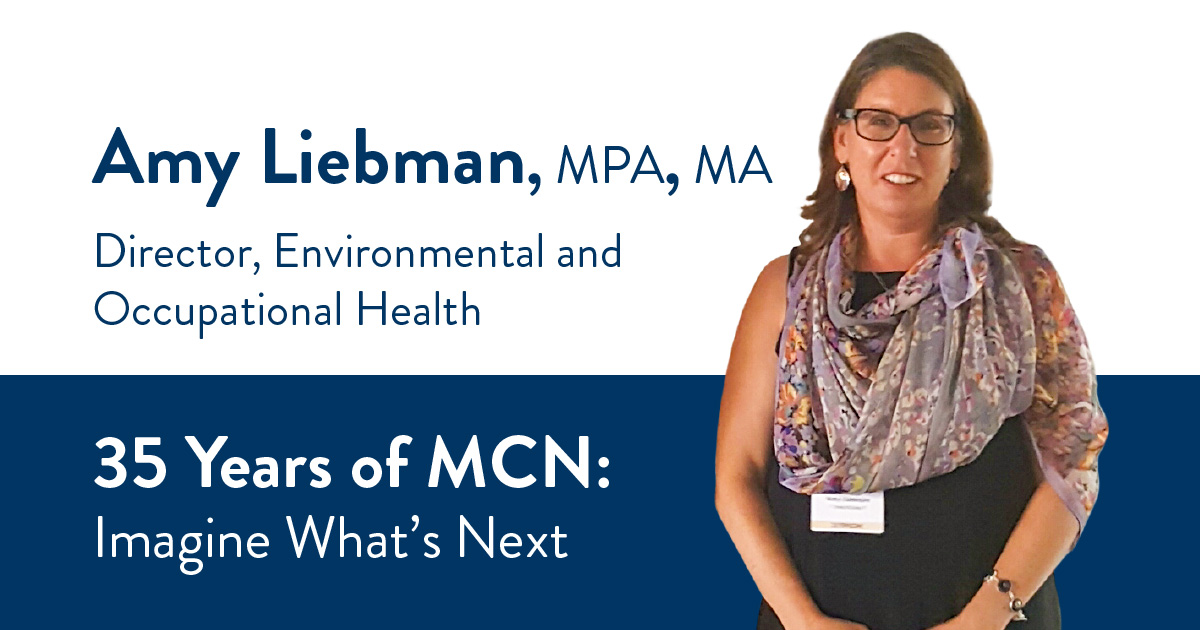
“I don’t know where it came from. I just have a very strong sense of justice,” declared Amy K. Liebman, MPA, MA, Director of Environmental and Occupational Health for Migrant Clinicians Network. Her work, particularly during a life-changing stint at the US-Mexico border and followed by a span of almost three decades at Migrant Clinicians Network, has advanced justice and equity in the exam room and in the workplace to benefit the health of thousands of low-wage workers across the US and beyond. But it began in her childhood, where justice was a revered family value. Her grandparents immigrated to the US after surviving the anti-Jewish pogroms carried out by Russian Cossacks. “My grandmother sewed clothing in a factory and my grandfather unloaded trucks,” she said, and family that remained in Eastern Europe perished during the Holocaust. “While basic survival was the focus of the first generation, social justice became the focus on the second generation and embraced by the third,” she said. In fact, she was named with social justice in mind: her middle name, King, is in honor of Martin Luther King, Jr., who was assassinated the year she was born. With this set of values as her backdrop as she approached college age, Liebman felt a draw toward understanding how US macroeconomics and political policy were affecting the daily lives of people around the globe. During her undergraduate work in Latin American Studies, “I tried to understand what US foreign policy in Latin America was doing,” she recalled, which morphed into a sense of urgency to help people who were harmed. “When I began grad school, I began to wonder how we could make change.”
As she studied through her dual masters’ degrees in Latin American Studies and Public Administration at the University of Texas, Austin, Liebman became highly motivated by the promotoras de salud model -- what would eventually be called the Community Health Worker model in the US -- that was growing in many regions in Latin America and the Global South at the time, and demonstrating significant gains in health outcomes. “I was very intrigued, wondering what it could mean for health. I began looking at the social determinants -- it of course wasn’t framed as such then -- the community factors that affect health,” she recalled. The model showed promise as a practical application to battle the health impacts of larger political and social forces that were hard to slow. After graduating, Liebman and her partner, Tim Dunn, headed to El Paso, where Dunn was continuing his studies on the militarization of the border.
It was an amazing time to be on the border, she said. Migration patterns had shifted, as a new border policy pushed migrants to attempt to cross in more dangerous locations, further into the desert. This also caused more migrants to stay in the US. The North American Free Trade Agreement had just passed, which was rapidly shape-shifting border work opportunities and the communities that support them. Mexico was transformed, as NAFTA forced many rural Mexicans from their land and into the cities for work. “There was the explosion of maquiladoras,” the factories based on low-wage labor, “and colonias on both sides of the border that were unincorporated, without running water or sewage services,” she added. Nine babies died of cholera in a colonia right across the border, the summer she arrived.
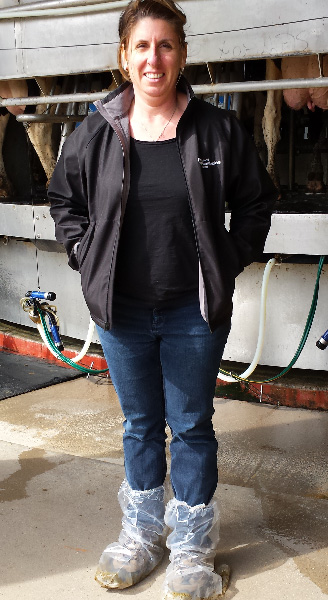
[Amy visits a dairy farm as part of her work to improve the occupational health and safety of workers]
In this environment, Liebman got a job as a program manager for environmental management at the University of Texas, El Paso, and began carrying on the work that Beatriz Vera had begun, with colleagues, including Jim VanDerslice. “They began a pilot project for the colonias showing how to disinfect water. They designed a hygiene education program for promotores who lived in the colonias. Through a train-the-training model, they talked to their neighbors about the importance of safe water storage, safe hygiene, and water disinfection,” Liebman said. She was directly and deeply involved in taking this pilot study to more communities, ultimately reaching thousands of families and winning awards for its efficacy and design. It was Liebman’s first on-the-ground interaction with the promotores model that she had studied -- she says it was one of the first environmental health-focused CHW projects in the US -- and spurred many of her future endeavors to promote the effective model for decades to come. It also cemented her future career path. “Water and sanitation are my first loves, as they have such a profound impact on human health,” said Liebman.
“One of the best things about working on the border was working with and learning from an amazing group of Mexican health professionals working in the community,” many of whom she continues to work with in various capacities, decades later, she noted. During this time, she met Alma Galván, MCH, Salvador Sáenz, and Patricia Juarez-Carillo. Sáenz developed a comic book on water safety, and Liebman and her team distributed the resource, reaching thousands of families on both sides of the border. Many of these early contacts still work closely with Liebman; Galván is now Senior Program Manager of Environmental & Occupational Health for MCN, and Sáenz designs MCN’s low-literacy Spanish language farmworker-focused comic books on a variety of health and safety topics.
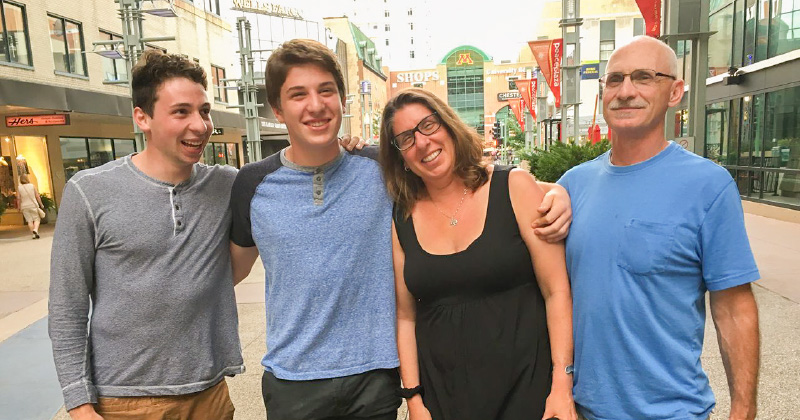
[Amy with her husband, Tim, and their two sons, Ben and Gabe]
During her time in El Paso, Liebman encountered Migrant Clinicians Network, and received a small MCN grant to complete trainings on water and sanitation in the state of Chihuahua. She later wrote a grant with MCN as a contractor to begin expanding MCN’s environmental and occupational health work. Meanwhile, she got married to Dunn and had her first son. When Dunn received a job opportunity in Salisbury, Maryland, a university town along the rural Eastern Shore, the young family decided to make the move, thousands of miles from the border. “I had been very border-focused, and I wanted to take my work to a national level and to keep working with immigrants,” Liebman said. Liebman consequently continued to work closely with MCN, eventually jumping into a permanent position to head up MCN’s efforts to improve the environmental and occupational health of farmworkers and other immigrants and their families. At MCN, she works closely with Jillian Hopewell, a colleague from her UT Austin days, and has grown her office of one into an MCN branch, with several MCNers working to address environmental health and worker health and safety.
In the many years since Liebman joined MCN, she has spearheaded numerous projects that have advanced her passion for and dedication to environmental health -- and broadened her focus to encompass the worker’s world. “When we’re looking at farmworkers and pesticide exposures, it’s a worker health and safety issue. There’s not just the environmental health component, but also the worker component,” she emphasized, and this realization affected her approach. She credits numerous early advisors and mentors in paving her path toward occupational health, like Matt Keifer, Kathy Kirkland, and Mike Rowland.
“Since I came to MCN, I’ve been able to build on the CHW model and apply it in different ways,” Liebman said. One of her most indelible projects is her extensive CHW and training program for immigrant dairy workers. The comic books and training modules from that project continue to be some of MCN’s most popular resources. She has also worked on several CHW projects that aim to protect children from environmental hazards and has spearheaded numerous partnerships to highlight the needs of farmworker children, helping parents connect the dots between pesticide residues on their clothes that they bring home, backyard pesticide drift, and in-home chemical exposures, and their children’s health. Crediting her colleagues, Liebman points to another mentor, Barb Lee, in helping champion the health and safety of children.
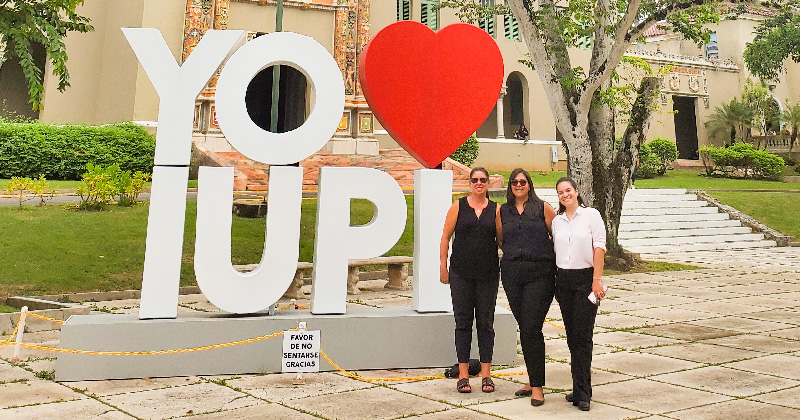
[Amy visits the University of Puerto Rico with MCN's Marysel Pagán-Santana, MS, DrPH, and Verónica Torres González]
Another multi-year project of high impact was MCN’s cooperative agreement with the Environmental Protection Agency, wherein MCN linked up with community health centers to bring basic environmental and occupational health into primary care. “I like the idea of looking at organizational systems change,” she said. “You can’t go in and think you can only offer training to clinicians on pesticide recognition and management, though. You’ll increase knowledge immediately, but how do you change their day-to-day behavior? Through systems changes and partnering with Chief Medical Officers. They say, ‘once you’ve seen one community health center, you’ve seen one community health center,’” she laughed. The project was consequently tailored to each system, with careful attention to efficiency and impact, improving recognition of environmental and occupational health concerns and utilizing the CHW model to support clinicians in educating their patients as appropriate. The EPA project, she says, first brought her to work in Puerto Rico. Liebman continues to launch new and exciting efforts where she sees a high level of need and potential, and MCN’s newest work in Puerto Rico on climate crisis and health equity fit the bill. “I’ve done a lot of work in Puerto Rico on environmental and occupational health and we’ve partnered with some wonderful colleagues and we’ve made a difference in several health centers. Our new programs build on this work, leveraging the amazing efforts of community health centers and addressing our climate crisis through a community-based approach to preparedness and response.”
The impactful projects and on-the-ground transformations that have bettered the lives of workers are just part of the reason Liebman has stuck with MCN; she also credits the freedom to pursue opportunities to make a big difference, with colleagues who care. “I love MCN as an organization, and it’s great to work with Karen [Mountain],” MCN’s CEO, Liebman said. “She brings in outstanding people and lets them take the ball and run with it. She has let me do that, pretty freely,” she admitted, and she credits the freedom for the success and utility of many of MCN’s projects. “I’ve learned so much and have enjoyed projects that allow me to work with amazing colleagues and clinicians who care deeply about workers.”
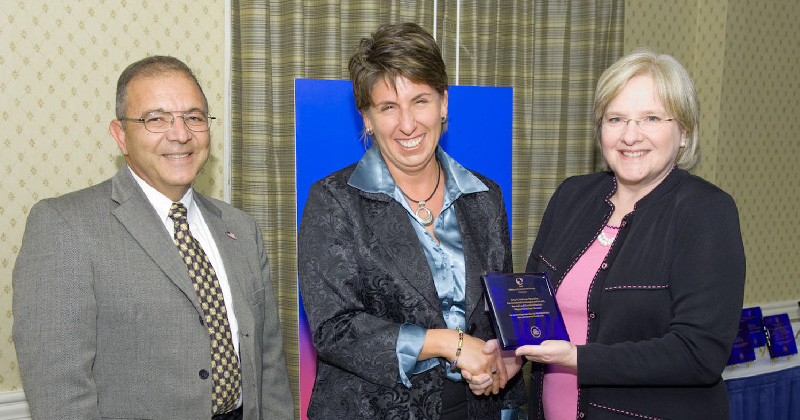
[Amy receives the EPA Children’s Environmental Health Champion Award]
Along the way, Liebman has become an expert in environmental and occupational health, particularly for farmworkers, speaking at hundreds of conferences, publishing op-eds, advancing advocacy efforts, and more. She has spearheaded policy efforts within the American Public Health Association advocating for stronger worker protection and serves on the federal advisory committee to the EPA Office of Pesticide Programs. Liebman, along with a coalition of partners, successfully advocated to strengthen the Worker Protection Standard, a key federal regulation to protect farmworkers from pesticide exposure. Her programs have won several awards including the EPA Children’s Environmental Health Champion Award and the National Safety Council Research Collaboration Award. In 2011, Liebman received the Lorin Kerr Award, an APHA/Occupational Health and Safety Section honor recognizing public health professionals for their dedication and sustained efforts to improve the lives of workers.
After several decades away from the border, Liebman finds her rural location as a benefit to her work, to keep her grounded and give her perspective. “I think it’s important that we understand each other. Here on the Eastern Shore, I am passionate about justice -- but I’m also not in a liberal enclave.” But keeping an eye on a broader reality, and the diversity of opinions about immigrants and migrants, hasn’t dampened her contagious enthusiasm about worker health and ever-optimistic view of the path forward. She brings humor and lots of laughter into her work -- she says it gets her through the darkness -- and, decades into her MCN journey, she remains highly motivated: “I don’t know. As people become more informed, and more educated, we have the ability to change minds and hearts. Maybe I’m being naive -- but I’ve seen it.”
Like what you see? Amplify our collective voice with a contribution.
Got some good news to share? Contact us on our social media pages above.
Return to the main blog page or sign up for blog updates here.
- Log in to post comments
